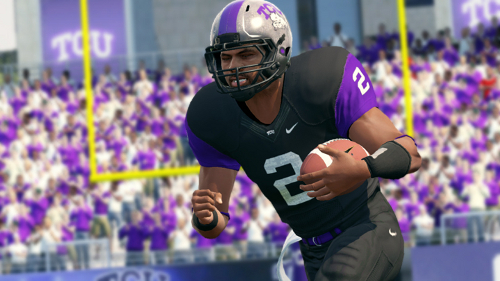EA Seeks Dismissal from Likeness Lawsuit

In a filing today Electronic Arts is seeking dismissal following the latest amended complaint in the player likeness lawsuit against the company, NCAA, and CLC. During the class action certification hearing EA and the CLC both threw the NCAA under the bus saying they shouldn’t be held liable given that they were just following the NCAA’s rules. That argument is appearing again now in the hopes, however slim despite happening once before, that they will be dismissed as defendants before the decision on class action certification comes down.
EA’s lawyers argue that the plaintiffs consider them to be liable because they followed the NCAA’s rules and “lobbied for, and obtained, administrative interpretations of those rules that permitted greater exploitation of student-athletes’ names, images and likenesses.” EA points out that the court has previously ruled that doing so is considered a commercial effort to obtain new rights and use their existing rights under the NCAA’s rules. The company now wants the legal sufficiency of the complaint tested before proceeding with the class action determination.
The plaintiffs’ complaint was amended when current athletes were added in order to qualify for consideration as a class should it be approved by the judge. A ruling on class action certification could come within the next few weeks if this filing by EA does not delay the timetable further.
[UPDATE] EA has been granted a hearing for September 5. That means a decision on whether the case will be certified as class action is unlikely to occur until later in September.
Earlier/Summary Below
The player likeness lawsuit against the NCAA, CLC, and Electronic Arts is the culmination of two high profile filings that were combined as led by Sam Keller and Ed O’Bannon (and O’Bannon now heads it up). It alleges improper use of player likeness through various forms of merchandise and media including video games in which the parties in question conspired to avoid paying players for their rights. Some interesting details and claims regarding the case at hand were revealed when EA was reentered as a defendant after initially being dismissed.
EA originally won a previous case regarding player likeness with the courts ruling video games are artistic works rather than commercial speech and therefore protected by the First Amendment. The Supreme Court in 2011 established forms of media, producing expressive works of art, are not subject to judgments based on incorporating someone’s name or likeness. That dismissed case however, involving Ryan Hart, has resurfaced after an appeals court reversed a decision based on that argument.
Recent uncovered emails have shown that NCAA representatives were well aware that players in games were based off real-life players. At one point the NCAA and EA had nearly reached an agreement to have actual player names included in the products. The EA Locker / Roster Share feature was a fallback option. With momentum clearly on the plantiffs’ side NCAA reps have begun to publicly express concern over the future of collegiate sports. A former EA Sports producer admitted players in NCAA games were based off real athletes.
The discovery of Tim Tebow’s name being in NCAA Football 10 could throw another wrench into EA’s series of arguments. Depositions from former Alabama wide receiver Tyrone Prothro and UConn basketball guard Tate George support the defendant’s reasoning for denying class action certification. The class action hearing resulted in the judge heavily questioning the legitimacy of a potential class and insisting a current athlete be involved. The judge required current athletes be added as plaintiffs for that party to have representation if the case is certified as class action. Six current college football players were added as plaintiffs in mid-July.
This consolidated case in California if certified as class action would go to trial – barring a settlement – and ultimately be the determining factor of how the NCAA proceeds in the future handling broadcasting rights, merchandising, and video games. Should a negative result come down, which one analyst has pegged as being a potential loss of $1 billion for EA, it would likely not just end the NCAA Football series but also with it any realistic possibility of college sports games being made in the future. The trial now is slated to begin June 2014. Appeals following a decision could extend the fight through 2020.
